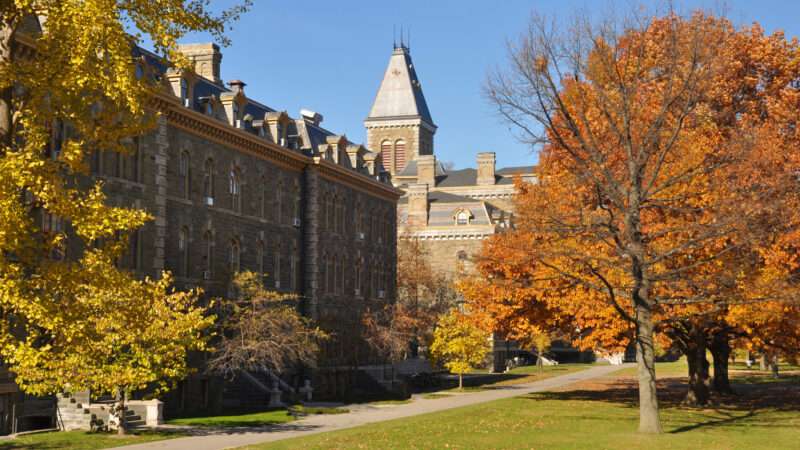
Campus free speech controversies have been making headlines in recent weeks, from the media flurry over student hecklers at a Federalist Society event at Stanford Law last month to an incident at San Francisco State University where a controversial campus speaker claimed she was physically assaulted by protesters.
However, as colleges—and their students—seem increasingly eager to abandon free expression, one school is trying to break the trend.
On Friday, the Cornell Chronicle reported that Cornell University's 2023–24 academic year would have a "free expression" theme, with students encouraged to "engage with" the ideas of free expression and academic freedom and to participate in "a wide range of scholarly and creative events and activities" that foster civil discourse. An official announcement from university President Martha E. Pollack will be released on April 17.
The change comes less than two weeks after the school gained widespread media attention after Pollack vetoed a resolution from the student assembly that would mandate trigger warnings for class material depicting "sexual assault, domestic violence, self-harm, suicide, child abuse, racial hate crimes, transphobic violence, homophobic harassment, xenophobia."
"We cannot accept this resolution, as the actions it recommends would infringe on our core commitment to academic freedom and freedom of inquiry, and are at odds with the goals of a Cornell education," Pollack wrote in a letter vetoing the resolution earlier this month.
Keeping that tone, according to Friday's announcement, Cornell will be focusing on "the significance, history and challenges of free expression and academic freedom" during the next school year through a spate of planned programming, including reading groups, debates, and art exhibitions.
"It is critical to our mission as a university to think deeply about freedom of expression and the challenges that result from assaults on it, which today come from both ends of the political spectrum," Pollack told the Cornell Chronicle. "Learning from difference, learning to engage with difference and learning to communicate across difference are key parts of a Cornell education. Free expression and academic freedom are the bedrock not just of the university, but of democracy."
The goal of this "theme," according to the Cornell Chronicle, is to help students "further develop the fluency and skills necessary for democratic participation, such as active listening, leading controversial discussions, leading effective advocacy and managing responses to controversial interactions."
This announcement is a welcome change for many free expression advocates. "The statement highlights the importance of engaging with controversial ideas," the Foundation for Individual Rights and Expression, a First Amendment nonprofit, wrote in a Friday press release. "Such engagement is a way to handle differences in a pluralistic society, where individuals may disagree over religion, politics, and ethics."
However, while it is refreshing to see an academic institution make a concerted effort to shape its environment around free speech and expression—it's nonetheless concerning that a free expression–themed school year is even necessary. The fact that adult college students aren't mature enough to engage in "active listening" and manage "responses to controversial interactions" on their own suggests that, while Cornell students may have been prepared for academic life, they're seriously lacking some basic social and communication skills.
The post Cornell Vows Free Expression–Themed Academic Year appeared first on Reason.com.







